America’s China Worries – Part III
America’s China Worries – Part III
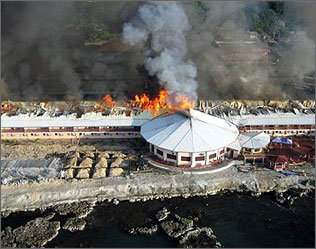
PORT MORESBY: Last year’s riots in the Solomon Islands and Tonga have highlighted not only racial tension between Chinese immigrants in the Pacific and the local population, but also China’s growing influence in the region. While the long-term expansion of Chinese presence and influence in the Pacific could herald the emergence of a contest between the US and China for supremacy in the region, fear of domination by economically more powerful immigrants may spark further clashes between Chinese and locals in the Pacific island states, introducing unrest in a region that until now has been relatively peaceful.
For more than a decade, an enduring Asian conflict has played out throughout the Pacific: the struggle by Taipei to attract and retain recognition for its “Republic of China” – Taiwan’s official name – and Beijing to deny those claims to legitimacy. Taipei’s efforts to get official diplomatic support include generous aid, something that the impoverished island-countries badly need. As a result, the Republic of the Marshall Islands, the Solomon Islands, Palau, Kiribati, Tuvalu and Nauru are among the 24 countries worldwide that recognize the “Republic of China.”
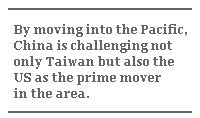
Beijing, however, has adopted similar tactics, funding government buildings in Vanuatu and Samoa, and paying for the construction of the venue for the 2003 South Pacific Games in Suva, the capital of Fiji. Aid from China comes in handy when traditional donors such as Australia and New Zealand have threatened to cut assistance because of corruption, nepotism and abuse of power in the Pacific states. During China’s 2004 national day celebrations, Tarcy Eri, a Papua New Guinea foreign ministry official, proclaimed that China’s voice at the United Nations was “one for the developing world.”
By moving into the Pacific, China is challenging not only Taiwan but also the US as the prime mover in the area. China provides military assistance to the few Pacific island-states that maintain armed forces, including Papua New Guinea, Fiji, Tonga and Vanuatu. Tonga especially proves the point that China is interested in strategic advantage in the Pacific. For years, Tonga was Taiwan’s staunchest ally in the region. But in 1998, Tonga shifted recognition to Beijing. Its then-king, Taufa’ahau Tupou IV, who passed away in September of last year, received a red-carpet welcome in Beijing along with promises of aid. Close relations between the military of the two countries have developed since. No more than 100,000 people live on Tonga’s 700 square kilometers – but it’s strategically located in the middle of the Pacific Ocean.
Official ties have permitted thousands of Chinese immigrants – mostly from the mainland – to settle in the Pacific islands, running grocery stores, restaurants and other small businesses. The numbers aren’t significant in a global context, but Chinese migration to Pacific island states with their tiny populations has upset traditional ethnic and economic balance.
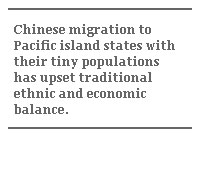
For instance, at independence from Australia in 1975, there were 50,000 non-citizens in Papua New Guinea. But because of a high crime rate, only a few thousand Australians, Britons and Germans remain. Mainland Chinese rapidly replace them as contractors and importers-exporters. According to official estimates, there are now about 10,000 Chinese settlers in Papua New Guinea.
In Fiji, many ethnic Indians, whose ancestors were brought there by the British to work on sugar plantations more than a century ago, have been forced to leave as ultra-nationalist Fijian politicians have assumed power. The departure of the Indian business owners has created a vacuum filled by Chinese immigrants.
This movement of Chinese – whether from the mainland or Taiwan – has not been without problems, as recent unrest in the Solomon Islands and Tonga shows. In April 2006 in the Solomons, a 1,000-strong mob of locals marched from the parliament house soon after a new prime minister had been announced. The mob, assuming that Snyder Rini’s campaign had been funded by Taiwanese interests, targeted all Chinese. About 2,000 ethnic Chinese live in the Solomon capital of Honiara among a total population of about 50,000. Most are naturalized descendants of workers brought in by the British during the colonial era, but in recent years a new wave of immigrants arrived from Taiwan and the Chinese mainland.
During the violent protests, about 90 percent of Honiara’s Chinese-dominated business district was burned. Shortly after the riots, the government in Beijing sent an airplane to evacuate more than 300 of its citizens. Order in the Solomons was restored after military intervention by Australia and New Zealand.
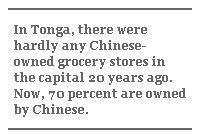
Commenting on the riots in an article in the local newspaper “The Solomon Star,” civil servant George Manimu wrote: “business areas, often referred to as reserved for nationals, have…become dominated by Asian entrepreneurs. The actions of the people (the riots), although criminal, reflect the release of bottled up frustrations and anger that they could not contain any longer.”
In Tonga, there were hardly any Chinese-owned grocery stores in the capital Nuku’alofa 20 years ago. Now, more than 70 percent are owned by newly-arrived Chinese, whose wealth and savvy have pushed local shopkeepers out of business. Riots broke out in November 2006, ostensibly because the government had been slow in implementing democratic reforms ahead of the scheduled 2008 elections. But the public’s anger turned on the Chinese in Nuku’alofa. Around 30 Chinese-owned stores were looted or burned before Australian and New Zealand troops intervened, while the Chinese embassy in Nuku’alofa arranged for the evacuation of 200 Chinese to Fiji.
China suffered a diplomatic setback when, in 2003, Kiribati switched recognition to Taipei. China not only closed its embassy in the capital Tarawa, but also had to dismantle a satellite-tracking station in place since 1997. The station was the only one of its kind outside China, and Kiribati, which straddles the Equator, was an ideal place for satellite-tracking.
The loss of the Tarawa station deprived Beijing of a land base in the Pacific, from where intelligence-gathering Yuan Wang ships could be coordinated. Now observers suggest that Papua New Guinea or Fiji, which both recognize Beijing, could be alternative Chinese bases near the Equator.
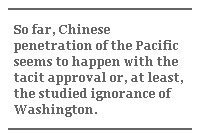
So far, much of the Chinese penetration of the Pacific seems to happen with the tacit approval or, at least, the studied ignorance of Washington. Aside from being preoccupied with its Middle Eastern imbroglio, the US needs China’s support for a solution to the North Korean problem. The US has even pulled diplomats from the Pacific region and downgraded its presence there. “It can no longer be taken for granted that Oceania will remain a benign ‘American lake,’” says Benjamin Reilly, senior lecturer at the Australian National University in Canberra. He argues that China is taking full advantage of the vacuum.
According to Mohan Malik, an analyst at the Asia-Pacific Center for Security Studies in Honolulu, Beijing has two major interests in the Pacific: In the short term, he says, it wants to “isolate Taiwan in the international community.” But in the longer term, Malik argues, the goal is to eventually displace the US as the guardian of the Pacific.
The region may not now be at the top of Beijing’s list of security priorities, where Taiwan and the Spratly Islands figure more prominently. But, as Reilly points out, China witnessed how Japan and other countries have historically used the islands in the service of building a Pacific empire – and a buffer between themselves and the US. China has shown no inclination to expand its influence by waging war, yet it seems inevitable that its interests will clash with those of the US in the longer term.
Bertil Lintner is a Swedish journalist based in Thailand, and the author of several works on Asia, including “Blood Brothers: The Criminal Underworld of Asia” and “Great Leader, Dear Leader: Demystifying North Korea Under the Kim Clan.” This article is part of a larger research project conducted under the auspices of the John D. and Catherine T. MacArthur Foundation.